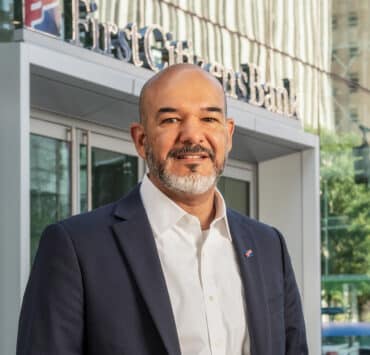|
Getting your Trinity Audio player ready...
|
Serving and defending others is something that came naturally to Christopher Garcia long before his time as a partner at Weil, Gotshal & Manges. While neither of his parents graduated from college, they both found ways to make important contributions to society. His mother was a receptionist in a district attorney’s office; his father was a fire marshal and arson investigator for the City of New York. For a time, the elder Garcia was part of Rescue 1, New York City Fire Department’s elite special operations unit.
The younger Garcia grew up on Long Island, and as he watched his parents work their jobs and live their lives, he noticed something: they did both in a special way. “My parents showed and taught me that helping others was just the right thing to do,” he explains. “I’ve always been involved in community service because that’s the example that was set for me.”
As Garcia navigated his teen years, he quickly saw law, government, and politics as valuable vehicles to advance his interest in public service. He completed his undergraduate studies at Harvard University, where he was cochair of the Institute of Politics. Upon graduation, he took a year off to edit a magazine in Washington, DC, and returned to Harvard Law School, where he was president of the Board of Student Advisers and senior editor for the Journal of Law and Public Policy.
While at Harvard Law, Garcia nurtured a growing interest in criminal law, which he attributes to the ongoing theme of serving the public interest. After gaining four years of experience at Davis Polk & Wardwell LLP, he spent nearly a decade in the US Attorney’s Office for the Southern District of New York. As chief of the securities and commodities fraud task force, he managed a team of thirty-five prosecutors and agents working together to stop insider trading in the world of commerce.
“My parents showed and taught me that helping others was just the right thing to do. I’ve always been involved in community service because that’s the example that was set for me.”
Christopher Garcia
He prosecuted hundreds of cases, many of which were related to the 2008 financial crisis. One of Garcia’s cases in that era brought $554 million in recovery while another generated a $1.2 billion settlement. “I became a lawyer at the US Attorney’s office,” Garcia says. “Being under pressure requires one to either develop or fail, and the talented people around me there helped me and pushed me to succeed.”
In 2012, Garcia joined Weil, Gotshal & Manges to build the law firm’s global white collar defense, regulatory, and investigations practice. He now focuses on defending people and corporations against regulatory and criminal investigations.
Although Garcia has now “switched sides” from prosecution to defense, he is still performing an essential duty to uphold the justice system by ensuring due process and advocating for defendants. His Weil clients include leaders in financial services, technology, and other industries.
One such client is Alonzo Weems, Eli Lilly & Company’s vice president and deputy general counsel, and corporate legal and general counsel for biomedicines business. When asked about Garcia, Weems says, “I’ve known Chris for a few years and he has proven to be among my most trusted outside counsel. He brings a sharp mind, deep insights from government and private practice, excellent judgment, and an ease in connecting with people—all to bear to help resolve the matter at hand.”
Garcia, who also conducts internal investigations and litigates securities class actions, has had many notable representations over the last twelve years. He successfully defended a top Wall Street firm in a two-week jury trial in which a Russian billionaire alleged insider trading. He also represented a large media company in a Department of Justice (DOJ) investigation regarding wire fraud and protected a Fortune 500 company against alleged price fixing.
As Garcia progresses in his career, he remains committed to service. Today, he sits on the board for the Legal Aid Society of New York. He also works with the Puerto Rican Bar Association and cochairs Weil’s diversity committee.
“The firm’s leaders are committed to advancing diversity, equity, and inclusion. These steps take time to develop at big firms, but they are important.”
Christopher Garcia
“The firm’s leaders are committed to advancing diversity, equity, and inclusion. These steps take time to develop at big firms, but they are important,” he says. Garcia and his colleagues have put processes and benchmarks in place, including a partner diversity report card, to drive outcomes in recruiting, retention, promotion, and partnership.
While Garcia coaches rising Latinx professionals, he also looks to mentor people from other backgrounds. It’s a lesson he learned from James W.B. Benkard, his first mentor at Davis Polk. Although Benkard and Garcia shared no natural commonalities, the veteran lawyer still took the time to invest in the young Garcia. “It showed me the importance of looking for and providing mentorship everywhere instead of only seeking people who look like you,” Garcia says.
Famed investor Warren Buffet once said, “You don’t find out who’s been swimming naked until the tide goes out.” Garcia uses that phrase to describe what’s happening in white collar crime today. Plenty of people have been skinny dipping, and tides are shifting as a new presidential administration tightens the reins.
The DOJ, the Securities and Exchange Commission, and other governmental bodies are taking a hard look at the crimes and violations they are willing to pursue. Robust enforcement is likely to follow as the groups become more aggressive in how they prosecute cases and punish lawbreakers.
Every firm with a white-collar practice is now in a building mode, and thanks to the work Garcia has done, Weil stands ready to serve its clients and grow its practice.

